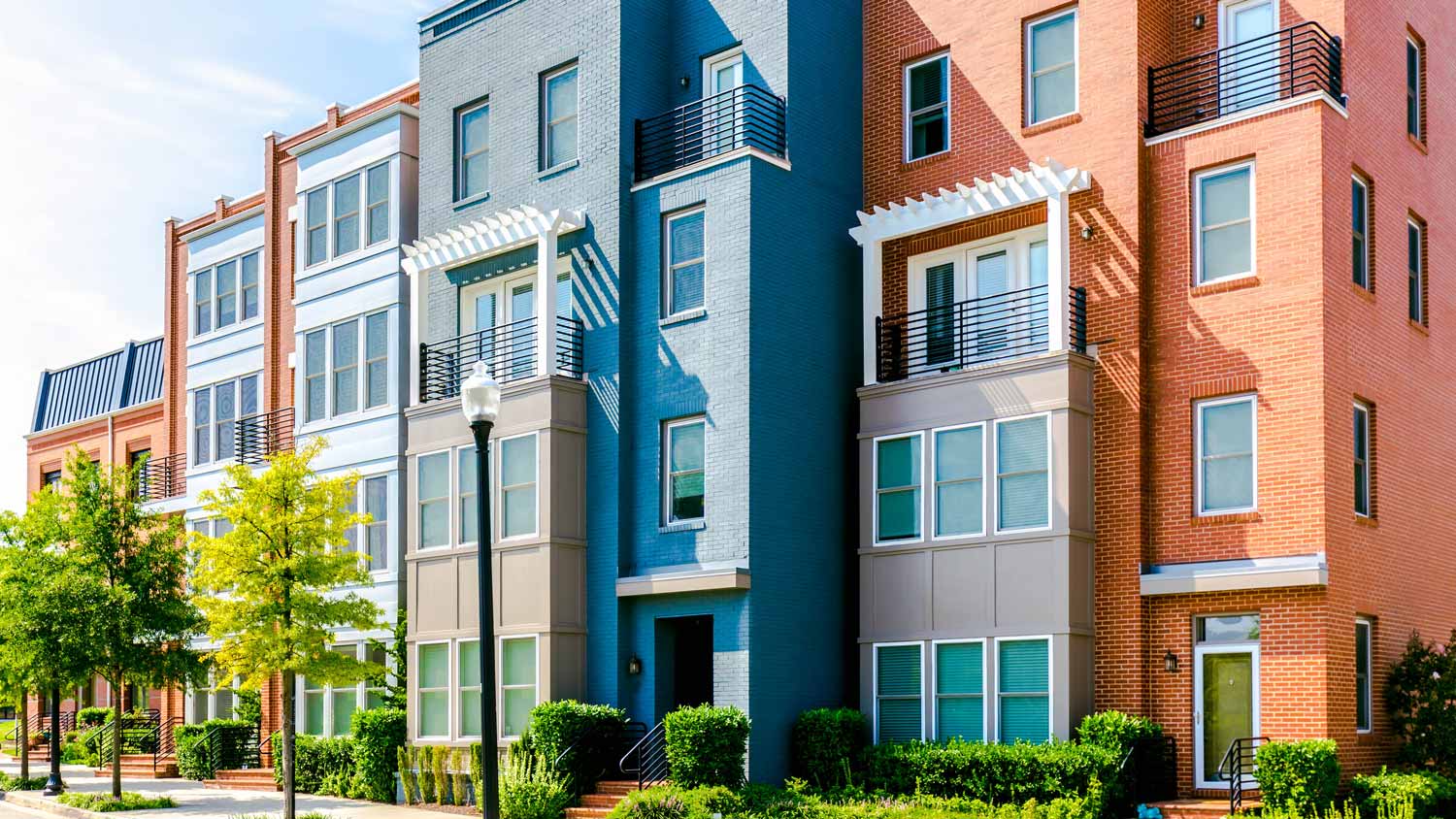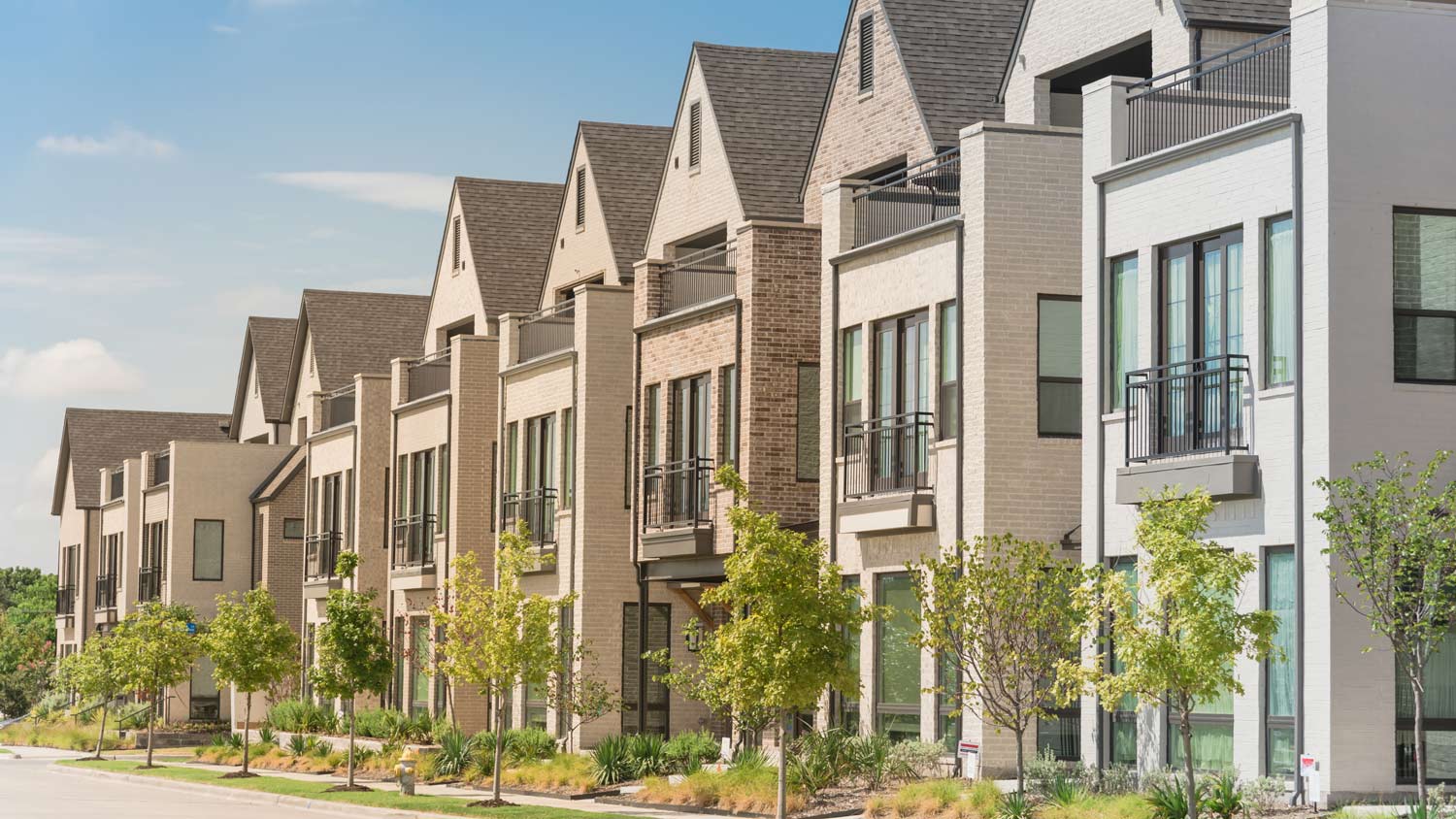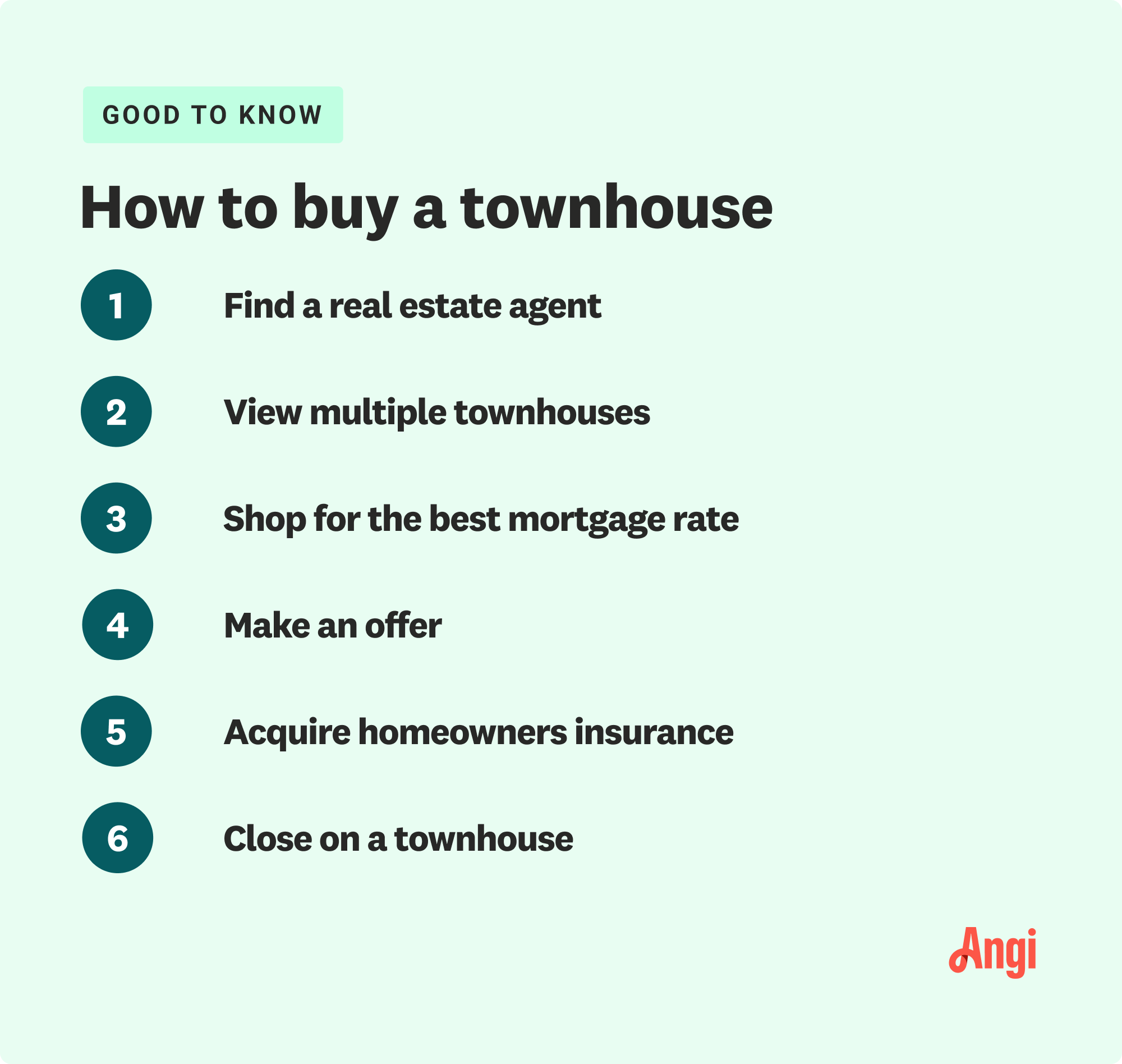Buying a Townhouse Checklist: Everything You Need to Know
Buying a townhouse is an exciting but major decision. Tackle it with confidence by following this checklist before you sign on the dotted line


If you are thinking of buying a townhouse, you probably already know that a lot goes into the process before you’ll be handed the keys. In fact, there’s a lot you need to know before (and after) you make an offer. Take on the process with confidence and avoid any potential indecision by following these checklists that cover everything you need to know when buying a townhouse.
What Do You Need to Know Before Buying a Townhouse?
If you are thinking of buying a townhouse, there are several things you should be aware of before making a final decision. Of course, there are obvious factors like the style and size of the property, its cost, and location that you need to consider. However, you should also understand aspects that are unique to townhouse living, like dealing with homeowners' associations and shared amenities.
Definition of a Townhouse
Townhouses are multi-floor residences that share one or two walls with neighboring structures but have their own private entrances. They may be identical or coordinated in appearance and can be grouped together in a community. A townhouse community can also have its own homeowners' association.
Who Is Buying a Townhouse Best For?
Townhomes are great for a variety of individuals or families. Ask yourself these questions before considering a townhouse:
Where do you want to live? Townhouses tend to be located closer to city centers or commerce hubs and offer many community amenities that you might not find in single-family homes.
How much home maintenance do you want to do? Townhouse living is also a good choice if you don’t have the ability or inclination to perform home maintenance since the homeowners’ associations or community organizations often handle these things.
Would you mind sharing a wall? Because townhomes share a wall or walls with their neighbors, residents need to understand there may be more noise and activity than in a single-family home on its own lot.
Why does a townhouse interest you? Townhomes tend to offer more of a sense of community due to shared amenities and shared walls, which can be desirable depending on your personality and stage in life.
Do I Need a Real Estate Agent to Buy a Townhouse?
You most likely need a real estate agent to help you negotiate a townhouse purchase, although if you are an experienced property buyer and seller, you may be able to handle your own transaction if it is fairly straightforward.
A real estate agent knows the ins and outs of the local market, however, and will be able to alert you to things like pocket listings (otherwise known as “off-market listings” or “exclusive listings” that are not yet made available to other agents or other prospective buyers) or let you know the real deal with different homeowner’s associations.
What Is a Homeowners' Association?

A homeowner’s association or HOA is a central governing body or group that handles decisions and manages projects (including costs) that affect the entire community. These can include things like shared areas such as parks or alleyways, lawn care, and upkeep for the roof and exterior of the homes.
An HOA can also determine the rules for things like exterior paint and siding colors, how you handle your garden or shrubbery, and disputes between neighbors over pets, noise issues, and anything else that affects the general community of townhome residents.
Homeowners' Association Fees
Maintenance costs and the costs of special projects are typically covered on a shared basis by the residents of a community with an HOA. The listing real estate agent should be able to give you an idea of the HOA fees associated with the townhouse(s) you are interested in and advise you of any upcoming special assessments or projects.
HOA fees in the United States vary by location and property, but you can generally expect to pay a few hundred dollars a month.
Determine the Costs of Townhouses in Your Area
People often purchase townhomes because they tend to be lower in price than single-family homes, and they enjoy the added sense of community. Accordingly, when you are thinking of buying a townhouse, ask yourself these questions:
How much does the average townhouse cost in your desired city and neighborhood, and how do the options you are looking at stack up?
Do you think that your potential townhouse is likely to maintain its value or appreciate in value?

Weigh the Pros and Cons of Buying a Townhouse
Buying a townhouse is a major decision, of course, and as such, it contains many pros and cons for you to analyze and weigh.
Pros:
Much of the maintenance may be handled by the HOA
Great sense of community thanks to shared amenities like pools or dog parks that may be available
Often closer to city centers or downtown hubs and public transit
Cons:
May require giving up some freedom of decision-making since residents are subject to the rules and fees determined by the HOA
Relative lack of privacy and outdoor space compared to a single-family home
Shared walls
In the end, choosing whether or not a townhouse is right for you depends on your family’s unique needs.
The Process of Buying a Townhouse

Buying a townhouse can be broken down into a few key steps.
Finding a Real Estate Agent
If you want to purchase a townhouse or any other real estate, you’ll want an agent who’s on your side. To help find one:
Get recommendations from friends and family on agents they’ve worked with in the past.
Check out online reviews and social media in the area(s) where you are looking to live.
Even driving around to see which agents are active can help you to find an agent you are comfortable with and who has the local expertise you need.
Questions to Ask When Viewing Townhouses
As you begin your search with your real estate agent, keep these questions in mind in order to find your dream townhouse.
Does the townhouse have a private outdoor space like a patio or deck, or are the community amenities sufficient outdoor space?
How many bathrooms are there? How many bedrooms? Will these be sufficient for your family and any guests you might regularly have?
What are the age, style, and condition of various appliances? Are they still under warranty, or will you need to get a home warranty policy? Will big-ticket items need to be replaced soon, or can you live with the current ones for a while?
Are the kitchens, bathrooms, or other rooms extremely dated, or are they current? Do you like the finishes, flooring, and other items that would be expensive and complicated to replace?
What is the age of the building? How much maintenance is required, and what are the associated costs?
Are there any major structural issues to consider before buying this townhouse, like issues with the roof or plumbing?
Is there an attached garage or carport, or is street parking okay and easy to find in the area?
Is the townhouse on a busy street or a quiet neighborhood? Which is preferable?
What is the deal with the homeowners' association (if applicable)? What are the fees, and how are they structured? How are special projects or extra expenses handled?
Who is responsible for maintenance like lawn care and snow removal, the owners or the HOA?
What are the rules around exterior painting, gardening, and other changes you might want to make?
What is the potential commute to my job or school like? How long does it take? Could you walk or ride a bike if you wanted to? Would it require dealing with city traffic?
What else is nearby? Grocery stores? Schools? A local main street or town hub? Any parks?
Is there an appropriate space for pets? Areas to walk a dog if need be?
Why is the current owner selling the property (if applicable)?
This last question could be key. Knowing why the townhouse you are interested in is on the market can be very revealing. For example, if there are loud businesses or streets nearby or there are a lot of upcoming home projects needed, you may want to take that into consideration.
Shopping for the Best Mortgage Rates and Working With Lenders
While there are some standards for mortgage rates and lending, you will likely want to shop around to ensure that you get the best deal.
Get pre-approved for a mortgage: Ideally, you should do this before you start looking at townhouse listings or any other real estate, as it can help you determine what you can afford and keep your home search within realistic budgetary boundaries. Moreover, getting pre-approved for a mortgage will make you a more competitive buyer in today’s challenging real estate market.
Work with someone you trust: Working with local mortgage lenders involves knowing the complexities of various regulations and rules around property sales, so it’s best to work with a mortgage broker who knows the ins and outs of buying a townhouse in your area.
Discuss your mortgage options: Different types of mortgage loans require different amounts of money down and different interest rates. This is why going in with some knowledge can be super helpful. Don’t be afraid to ask your potential lender lots of questions so you can find a loan that works for you.
Making an Offer on a Townhouse
When you finally find your perfect townhouse, it may seem like the end of the road, but it’s far from it. On the surface, dealing with bidding on a property seems simple: You set a maximum budget and don’t go higher than that. However, once you are involved in a townhouse bidding war, things can get trickier.
Set a maximum bid: This is one of the first things you need to figure out when you decide to put an offer in on a townhouse. Your real estate agent can help you to determine a bid that is competitive but fair.
Speak with your agent about contingencies: Your bid is not the only thing you should figure out before putting in your offer. For instance, you may have certain contingencies you are willing to accept, like a kitchen or bathrooms that need updating if you love everything else about the home. Similarly, you may be able to find more money in the budget if a place has everything you’d hoped for and then some, like a shorter commute or it’s in the best school district in the state (thus increasing resale value as well).
Figure out how you’ll communicate with your agent: In a competitive market, communicating quickly and effectively is key. Speak to your agent about how you’ll be communicating (through email, phone calls, texts or a combination) through the offer process to ensure everything runs smoothly.
Make sure you get a home inspection: This step and other due diligence are necessary before buying any home. While your real estate agent can likely answer some questions, and you can always do some online digging yourself, hiring a home inspector near you is essential. You want someone who is looking out for your best interests when you are making such a major purchase. You also want to hire one person who specializes in home inspections as opposed to multiple contractors who focus on different areas. This helps you to ensure a thorough inspection and gives you one point of contact.
Acquiring Homeowners Insurance
Shop around for homeowners insurance: If you don’t already have homeowners insurance, you will need to get a policy as part of the townhouse buying process.
Adjust your existing policy: Existing policies will need to be adjusted or changed to reflect the new property as well.
Brush up on your policy: This is a great time to read your homeowners insurance policy thoroughly to understand what is covered and what (if any) additional coverage you’ll need for the townhouse you are buying, along with anything your homeowners insurance may not cover.
Closing on a Townhouse
The final step of the townhouse buying process is the actual closing on the property. Having a smooth closing on a townhouse can be easier than you think, as long as you have everything organized.
Make sure you have your mortgage information, homeowners insurance, and related key documents in order.
Be sure you have had the home inspected by now.
Give yourself time to review and double-check everything before signing the deed.
Enjoy your new home.
- The Biggest Differences Between a Townhouse and a Duplex
- Can Your Real Estate Agent Buy Your House?
- The Best Home-Buying Checklist: From First Tour to Final Closing
- How to Buy a House: The Start-to-Finish Steps You Need to Know
- All the Things to Do Before Selling Your House
- Homeowners Association Questions You Need to Ask Before Move-In Day
- 9 Tips for Selling a Home by Owner
- Purchasing a Home From Afar: 8 Tips for Buying a Home Across the Country
- How Long Does a Home Inspection Take?
- Building vs. Buying a Home: Which Should You Choose?










